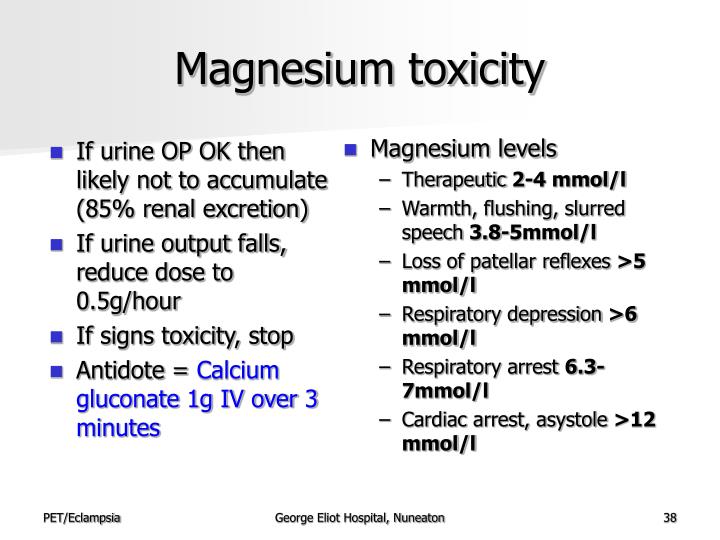

There are no controlled data in human pregnancy. Avoid use in the 2 hours before delivery unless it is the only therapy available for eclamptic seizures. Inform women that efficacy and safety for preterm labor has not been established, and that use beyond 5 to 7 days can cause fetal abnormalities. Use for preterm labor should be by obstetrical personnel in a hospital with appropriate obstetrical care facilities. Continuous IV infusion, especially more than 24 hours before delivery, can result in magnesium toxicity, including neuromuscular or respiratory depression, in the newborn. Intravenous use beyond 5 to 7 days can cause fetal abnormalities. Use is recommended only if clearly needed and the benefit outweighs the risk.

Magnesium sulfate is also known as: Epsom Salt, Sulfamag People with kidney disease or severe heart disease should take magnesium only under a doctor’s supervision.Magnesium sulfate Pregnancy and Breastfeeding Warnings

Most people benefit from 400 to 1,000 mg a day.Some may need much more depending on their condition.The RDA (the minimum amount needed) is about 300 mg a day.In fact, in one study in Kosovo, people under chronic war stress lost large amounts of magnesium in their urine.įood high in magnesium: Kelp, wheat bran, wheat germ, almonds, cashews, buckwheat, brazil nuts, dulse, filberts, millet, pecans, walnuts, rye, tofu, soy beans, brown rice, figs, dates, collard greens, shrimp, avocado, parsley, beans, barley, dandelion greens, and garlic Magnesium levels are decreased by excess alcohol, salt, coffee, phosphoric acid in colas, profuse sweating, prolonged or intense stress, chronic diarrhea, excessive menstruation, diuretics (water pills), antibiotics and other drugs, and some intestinal parasites. Much of modern life conspires to help us lose what little magnesium we do get in our diet. You must have it for your cells to make energy, for many different chemical pumps to work, to stabilize membranes, and to help muscles relax. This critical mineral is actually responsible for over 300 enzyme reactions and is found in all of your tissues - but mainly in your bones, muscles, and brain. Think of magnesium as the relaxation mineral.Īnything that is tight, irritable, crampy, and stiff - whether it is a body part or even a mood - is a sign of magnesium deficiency. Test Yourself with the Online Symptom Checker.Sleep Study for Insomnia and Sleep Apnea.ALCAT Test for Environmental Sensitivity.Integrative (i.e., Alternative, Complementary, and Supportive) Cancer Therapies.Allergies and Allergy Drops – A Natural Allergy Remedy.

Yeast Infection and Health Reset Protocol.Bio-identical Hormone Replacement Therapy (BHRT).


 0 kommentar(er)
0 kommentar(er)
